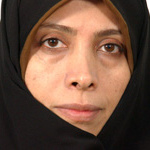A Timeworn Scenario
Elham Aminzadeh. Conservative member of the Iranian parliament

From setting aside the bindings of Additional Protocol and deciding to comply merely with the Non-Proliferation Treaty, to conversion of yellow cake into low-enriched uranium, to IAEA’s refusal to supply Iran with nuclear fuel needed for Tehran research reactor (despite NPT terms and conditions), Iran’s nuclear program has witnessed many ups and downs since it came under intensive international focus in 2003. These days, when beyond any authority, the UN watchdog is asking Tehran to hand low enriched uranium stock without any assurance that it would receive nuclear fuel rods for the research reactor, and when despite full compliance to NPT rules, the Board of Governors passes another resolution against Tehran’s nuclear activities, the Iranian government comes closer to the belief that whatever it does, it can’t win with Western powers.
While Iran remained fully committed to the charter and informed IAEA about every stage of its nuclear activities, the UN watchdog has moved in the opposite path. Iran now sees itself as a player in a never-ending game. Whenever Iran talks of its nuclear needs, the other side quickly decides to hold nuclear tea parties in Geneva, Brussels and New York and chitchat about Iran and its ‘real purposes’.
West is fully aware that based on the principles of international law and the IAEA charter, Iran has every right to initiate nuclear enrichment, even at a high level. However, there could be a chance of return if the international community and international organizations treat Iran’s nuclear program in a more reasonable way.
Time and again, Iran has announced that it is ready to purchase or swap for the nuclear fuel needed in Tehran’s research reactor. Iran’s gesture was not welcomed except at the initial level of negotiations [in Geneva]. But Iran could not use such small talk as nuclear fuel its research reactor. Iran needed a practical offer and now that its expectations have not been satisfied it has inevitably embarked on nuclear enrichment at the twenty percent level itself.
How did West react? Hillary Clinton has started a new round of trips to Middle East to heat up the US Iranophobia campaign once again. Right after her Middle Eastern dance, it will be time for international organizations to start their part. This is just a timeworn scenario.
New sanctions will be imposed against Iran while the nuclear swap proposal offered by West was only a stratagem for getting from Iran the uranium stock it has painfully piled up during the past four years. Despite its positive response to the offer, Iran had its own stipulations; though this situation should have never occurred had global powers abided by the NPT charter according to which each member has the right to receive nuclear fuel and technology for their peaceful nuclear activities.
No nuclear document gives the right to either IAEA or global powers to set such terms and conditions in order to supply a country with nuclear material. Iran, however, agreed to the proposal, but aware of the poor record of United States, Germany and France in their nuclear cooperation with Iran (all had violated their nuclear contracts with Iran signed under the Pahlavi regime) Iran could hardly put trust on them. So Tehran has asked for simultaneous exchange of nuclear fuel and its uranium stock, a reasonable request which seems to have fallen on deafened ears in West.
While Iran remained fully committed to the charter and informed IAEA about every stage of its nuclear activities, the UN watchdog has moved in the opposite path. Iran now sees itself as a player in a never-ending game. Whenever Iran talks of its nuclear needs, the other side quickly decides to hold nuclear tea parties in Geneva, Brussels and New York and chitchat about Iran and its ‘real purposes’.
West is fully aware that based on the principles of international law and the IAEA charter, Iran has every right to initiate nuclear enrichment, even at a high level. However, there could be a chance of return if the international community and international organizations treat Iran’s nuclear program in a more reasonable way.
Time and again, Iran has announced that it is ready to purchase or swap for the nuclear fuel needed in Tehran’s research reactor. Iran’s gesture was not welcomed except at the initial level of negotiations [in Geneva]. But Iran could not use such small talk as nuclear fuel its research reactor. Iran needed a practical offer and now that its expectations have not been satisfied it has inevitably embarked on nuclear enrichment at the twenty percent level itself.
How did West react? Hillary Clinton has started a new round of trips to Middle East to heat up the US Iranophobia campaign once again. Right after her Middle Eastern dance, it will be time for international organizations to start their part. This is just a timeworn scenario.
New sanctions will be imposed against Iran while the nuclear swap proposal offered by West was only a stratagem for getting from Iran the uranium stock it has painfully piled up during the past four years. Despite its positive response to the offer, Iran had its own stipulations; though this situation should have never occurred had global powers abided by the NPT charter according to which each member has the right to receive nuclear fuel and technology for their peaceful nuclear activities.
No nuclear document gives the right to either IAEA or global powers to set such terms and conditions in order to supply a country with nuclear material. Iran, however, agreed to the proposal, but aware of the poor record of United States, Germany and France in their nuclear cooperation with Iran (all had violated their nuclear contracts with Iran signed under the Pahlavi regime) Iran could hardly put trust on them. So Tehran has asked for simultaneous exchange of nuclear fuel and its uranium stock, a reasonable request which seems to have fallen on deafened ears in West.

